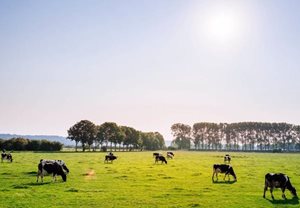One of the most exciting times of the year on the farm where I grew up was when the cow herd was released for the first time after the winter into spring grass.
 When the gate opened, the leading cows would sniff suspiciously at the ground to check out what was going on. Then some more impatient members of the herd would push from behind, and off they would go. When they entered the field they went wild, sporting with their tails high like they had just found their legs for the first time, or had become calves again. On the continent, some farmers have made this annual spectacle into a tourist attraction.
When the gate opened, the leading cows would sniff suspiciously at the ground to check out what was going on. Then some more impatient members of the herd would push from behind, and off they would go. When they entered the field they went wild, sporting with their tails high like they had just found their legs for the first time, or had become calves again. On the continent, some farmers have made this annual spectacle into a tourist attraction.
Not going back
To be sure, there are some false starts in the return to grazing. If the weather takes a sharp turn for the worst, as it easily can do in April, the herd will be back in again. But having tasted fresh grass, it is hard to return to last year’s silage. This year the release of cows to grass coincides with our own tentative release from lockdown. We may be tempted to skip with joy too. And we certainly do not want to ever go back.
Freedom, and liberation from bondage, is a huge theme in the Bible. The most notable example in the Old Testament is the freeing of the Israelites from the bondage of slavery in Egypt. They “groaned because of their slavery and cried out for help,” and “Their cry for rescue from slavery came up to God” (Exodus 2:23). Because the Lord loved his people, He brought them “out with a mighty hand” and redeemed them “from the land of slavery” (Deuteronomy 7:8).
We also read in Exodus 15:20 that when this was achieved, Miriam took a tambourine in her hand and all the women, tambourines in hand too, followed her and danced. It must have been quite a scene, but their freedom was found in coming to belong to God, rather than to Pharaoh.
In the New Testament, we learn that Jesus Christ came to liberate people from the spiritual bondage caused by sin, which we are all born with and are slaves to (John 8:34). God the Father saw the groaning of mankind under the tyranny of sin and sent Jesus, “‘to proclaim liberty to the captives …to set at liberty those who are oppressed’” (Luke 4:18) (English Standard Version (ESV.)) through the wonder of the cross.
Freedom in Christ
If we admit our sin to God, and trust in the power of Jesus’ sacrifice on the cross to atone for that sin, he will forgive us and set us free from sin’s power that so entangles us. God then delivers us, “from the domain of darkness” and transfers us into, “the kingdom of his beloved Son, in whom we have redemption, the forgiveness of sins” (Colossians 1:13 &14) (Berean Study Bible).
Have you, like me, called on the Name of Jesus asking him to liberate you? We read in John 8:36 that “If the Son sets you free, you will be free indeed” (ESV). With His pardon we receive eternal life and the Holy Spirit to dwell within us, who is a Spirit of joy. With God’s salvation, “You shall go out leaping like calves from the stall” (Malachi 4:2). What a spectacle of joy! Once experienced, there is no going back.
 Rev Norman Smyth is married to Linda and they have three children. The son of a County Antrim dairy farmer, he is the minister of First and Second Markethill in County Armagh.
Rev Norman Smyth is married to Linda and they have three children. The son of a County Antrim dairy farmer, he is the minister of First and Second Markethill in County Armagh.
His blog appeared in a fortnightly column entitled ‘Good News For the Countryside’, in today’s Farming Life, where people from a farming background, or who have a heart for the countryside, offer a personal reflection on faith and rural life.
You can read Normans’s contributions, and look at other reflections in this series of blogs, here.
If you would like to talk to someone about any of the issues raised in this article, please call Rev Kenny Hanna on 028 9753 1234 or email him at khanna@presbyterianireland.org.